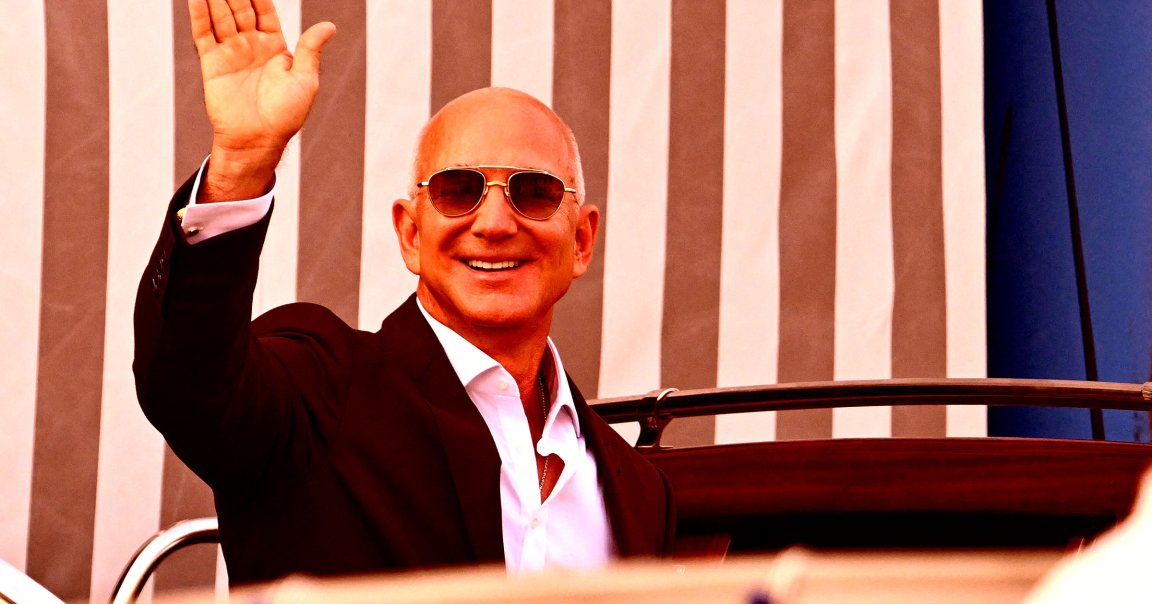
Many investors and financial experts are concerned that a looming AI bubble could wreak havoc on the economy — but Amazon founder Jeff Bezos can’t wait for it to burst.
During a tech conference in Italy last week, Bezos conceded that the AI industry is in a “kind of industrial bubble,” as CNBC reports.
Besides companies’ valuations becoming “disconnected from the fundamentals” of a business, Bezos argued that “people get very excited like they are today about artificial intelligence.”
But to the fourth-richest person in the world, a collapse of the AI industry could eventually be a positive development — because, in his mind, it could eliminate the weak from the market.
“The [bubbles] that are industrial are not nearly as bad, it can even be good, because when the dust settles and you see who are the winners, societies benefit from those inventions,” he argued. “That is what is going to happen here, too.”
“This is real, the benefits to society from AI are going to be gigantic,” the billionaire said.
Bezos’ comments highlight tech leaders’ and investors’ continued insistence that the tech will eventually “usher in an era of abundance” marked by a boost in productivity, cheaper goods, and people living healthier lives. That kind of optimism has played a key part in an industry that has poured astronomical amounts of resources into a tech that still has a lot to prove.
Experts have become increasingly skeptical of the industry’s claims, though, as it becomes clear that AI isn’t yet ready to replace workers. A landmark MIT study earlier this year found that a whopping 95 percent of generative AI pilots at companies are falling flat, failing to drive rapid revenue growth.
Bezos isn’t alone in arguing that an AI bubble could ultimately be a positive development.
“When bubbles happen, smart people get overexcited about a kernel of truth,” OpenAI CEO Sam Altman told a small group of reporters in August, as quoted by The Verge. “Are we in a phase where investors as a whole are overexcited about AI? My opinion is yes.”
At the time, Altman argued that “someone” will lose a “phenomenal amount of money,” seemingly implying that OpenAI could survive largely unscathed.
“My personal belief, although I may turn out to be wrong, is that on the whole, this will be a huge net win for the economy,” he added, closely echoing Bezos’ latest comments.
More recently, Altman reiterated that “people will overinvest and lose money, and underinvest and lose a lot of revenue,” during a tour of one of his firm’s data centers being built in Abilene, Texas, earlier this month, as quoted by The Associated Press.
“We’ll make some dumb capital allocations,” he added, but “over the arc that we have to plan over, we are confident that this technology will drive a new wave of unprecedented economic growth.”
Bezos and Altman’s optimism highlights a growing divergence between their lofty promises and actual expectations.
“When [investors are] excited, they tend to think about the good things that can go right, and they diminish the things you should be skeptical about that can go wrong,” said Goldman Sachs CEO David Solomon at the same tech conference in Italy last week, as quoted by CNBC. “I think that there will be a lot of capital that’s deployed that will turn out to not deliver returns.”
“There will be a reset, there will be a check at some point, there will be a drawdown,” he added. “The extent of that will depend on how long this [bull run] goes.”
More on the AI bubble: Bank of England Warns of Impending AI Disaster